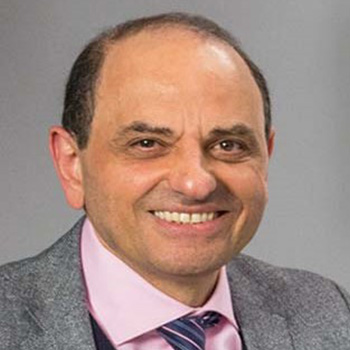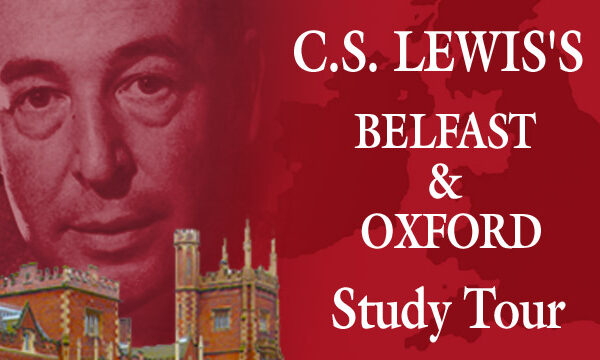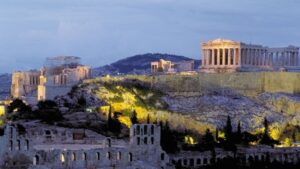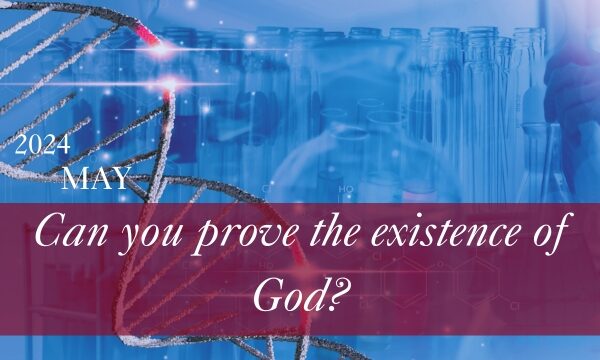Back to series



In Search of Unknown Gods
Click here to open a Print - Friendly PDF
Evangelism is traditionally depicted as Christians grappling with the faith of their contemporaries in order to share the good news of Jesus with them. Yet today many of us find such grappling hard because there seems to be nothing there firm enough to grapple with. What our friends believe is not fixed, certain or even explicit; they affirm everything and deny nothing. Grappling with something so vague is like grasping water; it flows through your fingers. How can you share the faith amongst those who do not seem to have a faith?
Christians who turn to their Bibles for help here can feel curiously frustrated. Evangelism in the New Testament was carried out in the presence of overt, firmly held and very solid religious beliefs made visible in shrines, temples and idols. It is all so very different. Yet, in the account in Acts 17 of Paul’s visit to Athens, we are given a brief glimpse of a culture that resembles our own. There too, we see a multi-faith world where skepticism occurred alongside credulity and philosophy coexisted with superstition.
An Oddity in Athens
A curious feature of this encounter is Paul’s reference to shrines to an Unknown God. At the mention of the worship of Unknown Gods we are inclined to scratch our heads in puzzlement and move on. After all, a belief in Unknown Gods is a supremely bizarre concept. How can you worship what is totally unknown? Enormous problems emerge with such gods. Are they good or bad, kind or cruel? What do they want? How would you address your prayers to an Unknown God? “To Whom it May Concern?” It is these absurdities that underlie Paul’s references to the worship of an Unknown God; for all their show of religion and wisdom, the Athenians are ignorant of the reality of who God is and what he requires.
 Yet before putting the concept of Unknown Gods in that very big waste-bin marked Absurd Religious Ideas of Antiquity it is worth pausing. Why did anybody put up shrines to Unknown Gods? The answer seems plain. The Athenians so hungered for blessing and protection from calamity that they took out the spiritual insurance of offering worship to “anybody else out there who we may have overlooked”.
Yet before putting the concept of Unknown Gods in that very big waste-bin marked Absurd Religious Ideas of Antiquity it is worth pausing. Why did anybody put up shrines to Unknown Gods? The answer seems plain. The Athenians so hungered for blessing and protection from calamity that they took out the spiritual insurance of offering worship to “anybody else out there who we may have overlooked”.
Seen like that, the relationship of these Unknown Gods to the beliefs of present day society is clear. Although those specific Athenian deities may be long dead, the pressures that created them still exist. Two thousand years on from ancient Athens, men and women still walk uncertain paths through life and still seek what was sought then: blessing and protection.
The Search for Blessing
Despite the relentless atheistic propaganda that all there is to life is birth, reproduction and sex, our contemporaries still hope for more. They long for peace, joy, fulfilment and meaning, and dream that, one day, their lives will climb out of the grey clouds that surround them into the sunlight blue skies of blessing. In their longing they turn to many things. Some seek such a blessing in their careers, in the expectation (increasingly less confident with time) that their next promotion or pay rise will bring them their heart’s desire. For others, it is the lottery win that will bring in the age of joy. Others seek the blessing in pleasures; in shopping, sport, entertainment, cooking, clubbing, or in health, families or the pursuit of fitness. Still others look for blessing in holidays or in some quiet rural retirement place where, at last, they will be blessed. This hunger for blessing lies behind so much of our culture’s feverish activity.
The Search for Protection
And as our contemporaries long for blessing they also search for protection. For all our knowledge, fate, destiny or bad luck still prowl the world doling out misfortune and there is a deeply entrenched hope that such calamities can be averted. How often do our contemporaries react to some news of tragedy by muttering ‘there but for the grace of God go I’, crossing themselves, or touching wood? Today the bringer of disaster may be a downturn in the economy rather than black magic, a cancer rather than a curse, but it makes no real difference. Men and women still lie awake and wonder how the unknown gods that rule their lives may be persuaded to spare them. Some seek protection in such morally neutral (and unsupernatural) things as insurance, healthcare and pension schemes; some turn to superstition with horoscopes, charms and palmistry, and some descend deeper to spells, witchcraft and spirit guides.
Our contemporaries may not look to exactly the same gods as the Athenians did but they have the same twin needs of blessing and protection. And as they seek blindly around them for things and powers that will answer those needs, the Unknown Gods of Athens are remade.
So How Does That Help Us?
So what light does this shed on sharing our faith today? First, we need to practice that most valuable (but neglected) evangelistic skill of listening. We need to let our friends tell us their hopes and fears. They may do it naturally or we may need to sensitively and lovingly prompt them. In terms of blessing we might then ask what they really want in life; what is it that would make their life complete? Or we might – with even greater sensitivity – pursue the issue of protection: what worries them? What is their biggest fear? As we listen to their answers we will learn of the forms that the Unknown Gods of blessing or protection take in their lives.
Then, as Paul did, we need to point out the superiority of Jesus. As ever, the Unknown Gods merely promise blessing and protection; they do not deliver it. They cannot, for it is not in their power. In contrast, in Jesus, the real God has allowed himself to become really known and has shown his character. He has declared that he is the God who can be trusted. There is another contrast. Even if they could, the Unknown Gods cannot be relied on because they make no covenants and sign no contracts. After all, they bear no names. But in Jesus, God has sworn to eternally protect and bless his people and has guaranteed that oath with his own blood. Why choose the Unknown Gods for blessing and protection when you can know the One is real and reliable?

J. John
EvangelistJ. John (Rev’d Canon) has been an evangelist for 40 years. J. John has a Lambeth M.A. and is an Honorary Canon of Coventry Cathedral. He has spoken at conferences, universities and in towns and cities across 69 countries on 6 continents. This has included 36 series of Just10, re-examining the Ten Commandments. In 2017 he launched JustOne at the Arsenal Emirates Stadium in London, and JustOne events are conducted throughout the UK. He has written several books across a range of subjects including the Theology For Little People series to help children understand biblical truth.

 COPYRIGHT: This publication is published by C.S. Lewis Institute; 8001 Braddock Road, Suite 301; Springfield, VA 22151. Portions of the publication may be reproduced for noncommercial, local church or ministry use without prior permission. Electronic copies of the PDF files may be duplicated and transmitted via e-mail for personal and church use. Articles may not be modified without prior written permission of the Institute. For questions, contact the Institute: 703.914.5602 or email us.
COPYRIGHT: This publication is published by C.S. Lewis Institute; 8001 Braddock Road, Suite 301; Springfield, VA 22151. Portions of the publication may be reproduced for noncommercial, local church or ministry use without prior permission. Electronic copies of the PDF files may be duplicated and transmitted via e-mail for personal and church use. Articles may not be modified without prior written permission of the Institute. For questions, contact the Institute: 703.914.5602 or email us.
-
Recent Podcasts
Christian Faith and the Natural Sciences
by Alister McGrath, Aimee Riegert on May 17, 2024In recent years, there has been growing interest...Read More
-
Questions That Matter Podcast – Lee Strobel and the Question of Whether God is Real
by Randy Newman, Lee Strobel on May 17, 2024
-
The Side B Stories – Dave Rankin’s Story
by Jana Harmon, Dave Rankin on May 10, 2024
-
Recent Publications
Can you prove the existence of God?
by Randy Newman on April 18, 2024What if we only need pointers that suggest...Read More
-
Isn’t Morality Relative?
by Christopher L. Reese on April 1, 2024
-
Do Muslims and Christians Worship the Same God?
by Andy Bannister on March 1, 2024
0
All Booked
0.00
All Booked
0.00
All Booked
20599
GLOBAL EVENT: 2024 Study Tour of C.S. Lewis’s Belfast & Oxford
https://www.cslewisinstitute.org/?event=global-event-2023-study-tour-of-c-s-lewis-belfast-oxford-2&event_date=2024-06-22®=1
https://www.paypal.com/cgi-bin/webscr
2024-06-22

Next coming event
Days
Hours
Minutes
Seconds
GLOBAL EVENT: 2024 Study Tour of C.S. Lewis’s Belfast & Oxford
On June 22, 2024 at 12:00 pmat Belfast, Northern Ireland & Oxford, EnglandSpeakers

J. John
Evangelist
Team Members

J. John
EvangelistJ. John (Rev’d Canon) has been an evangelist for 40 years. J. John has a Lambeth M.A. and is an Honorary Canon of Coventry Cathedral. He has spoken at conferences, universities and in towns and cities across 69 countries on 6 continents. This has included 36 series of Just10, re-examining the Ten Commandments. In 2017 he launched JustOne at the Arsenal Emirates Stadium in London, and JustOne events are conducted throughout the UK. He has written several books across a range of subjects including the Theology For Little People series to help children understand biblical truth.





